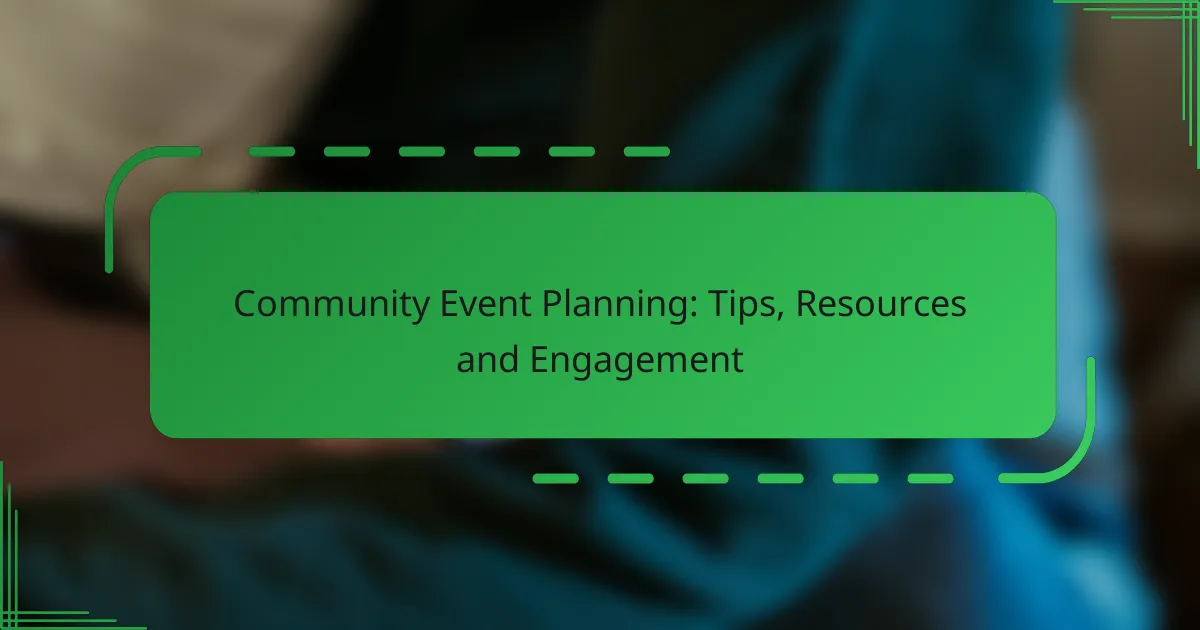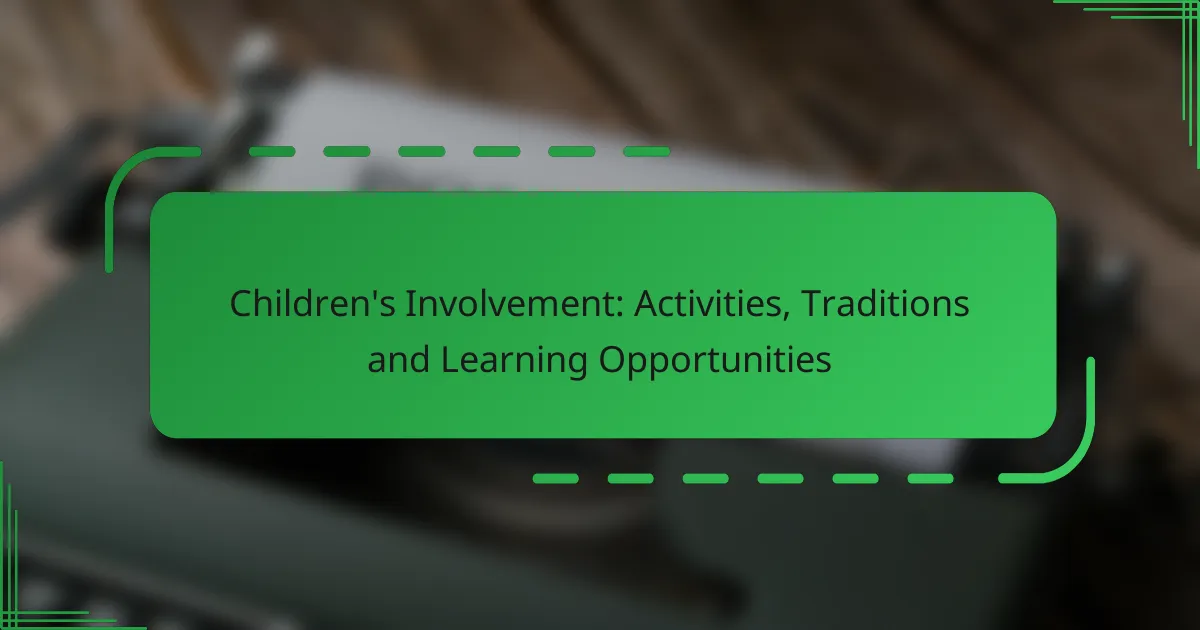Planning a successful community event requires a clear understanding of your objectives and audience, along with meticulous logistical considerations. Utilizing essential resources such as event planning software and local vendor directories can streamline the process and enhance community engagement. By actively involving community members through social media and pre-event activities, you can foster excitement and ensure a memorable experience for all.
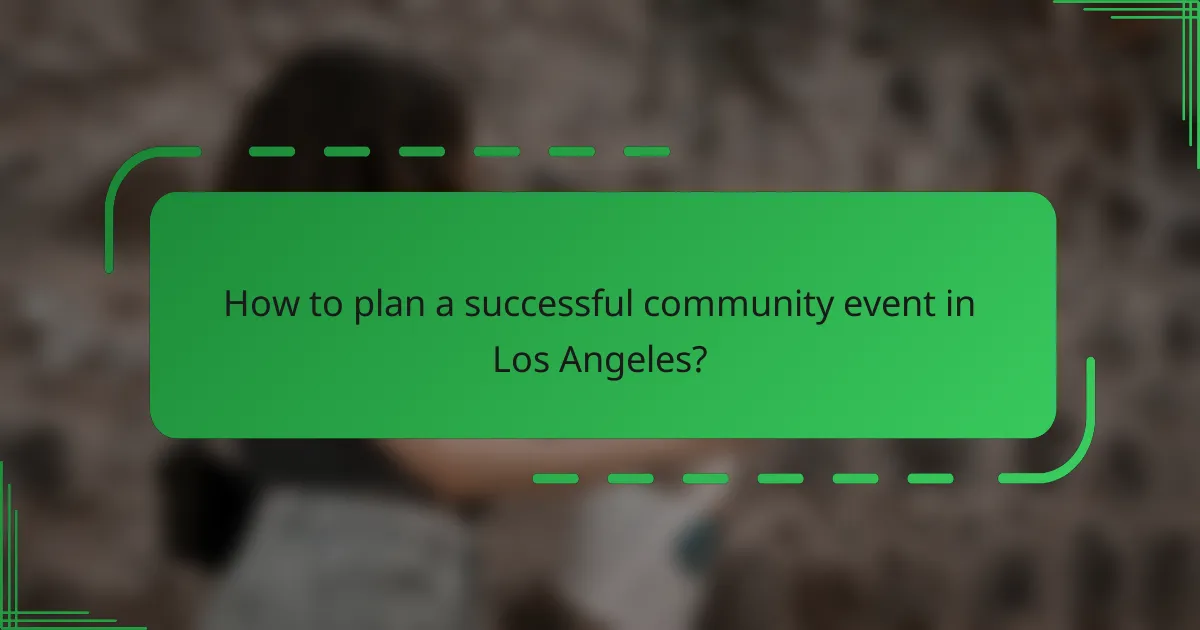
How to plan a successful community event in Los Angeles?
Planning a successful community event in Los Angeles requires clear objectives, an understanding of your audience, and careful logistical considerations. By focusing on these elements, you can create an engaging experience that resonates with the local community.
Define clear objectives
Establishing clear objectives is crucial for guiding the planning process of your community event. Consider what you want to achieve, whether it’s raising awareness for a cause, fostering community connections, or providing entertainment.
Write down specific goals, such as attracting a certain number of attendees or engaging local businesses. This clarity will help measure success and inform decisions throughout the planning stages.
Identify target audience
Knowing your target audience is essential for tailoring your event to their interests and needs. Consider demographics such as age, cultural background, and community involvement when defining your audience.
Engage with local groups or conduct surveys to gather insights about what your audience values. This information will help you create relevant programming and marketing strategies that resonate with potential attendees.
Choose an appropriate venue
Selecting the right venue can significantly impact the success of your community event. Consider factors such as location, capacity, accessibility, and amenities when evaluating potential sites in Los Angeles.
Popular venues might include parks, community centers, or local theaters. Ensure the venue aligns with your objectives and can accommodate your expected audience comfortably.
Create a detailed timeline
A detailed timeline is vital for keeping your event planning on track. Start by outlining major milestones, such as booking the venue, securing permits, and promoting the event.
Break down tasks into manageable steps and assign deadlines to each. Regularly review and adjust your timeline as needed to ensure all aspects of the event are covered in a timely manner.
Budget effectively
Effective budgeting is key to a successful community event. Begin by estimating all potential costs, including venue rental, permits, marketing, and supplies. Factor in potential revenue sources, such as sponsorships or ticket sales.
Keep a close eye on expenses and be prepared for unexpected costs. Consider creating a budget spreadsheet to track income and expenditures, ensuring you stay within your financial limits while maximizing the event’s impact.
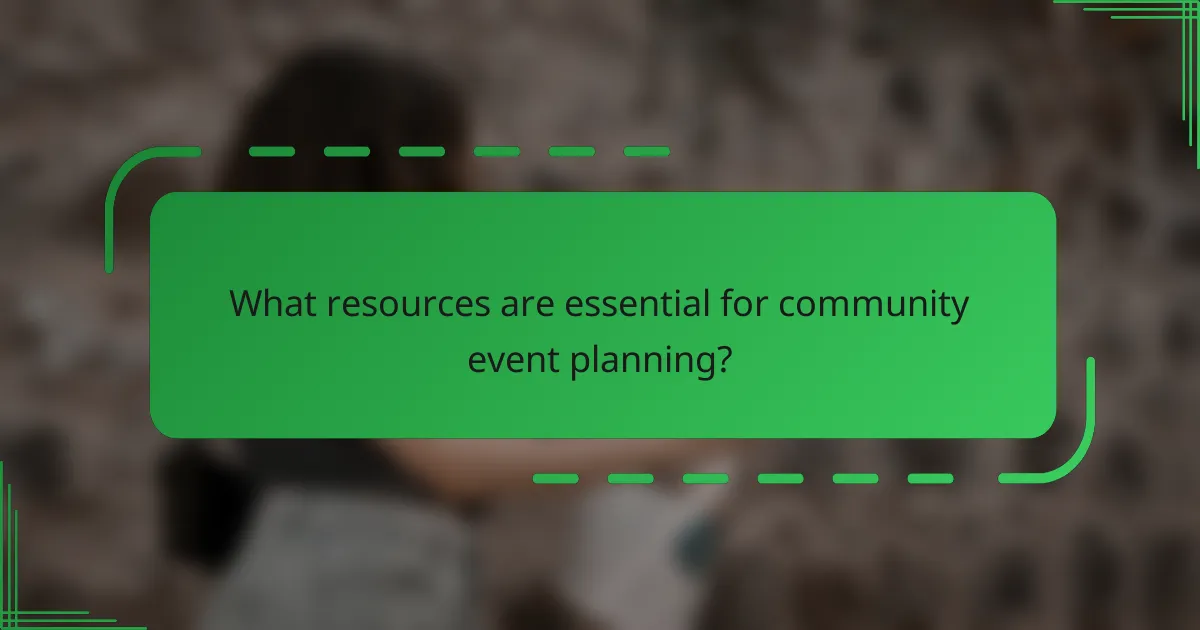
What resources are essential for community event planning?
Essential resources for community event planning include event planning software, local vendor directories, and community engagement platforms. These tools help streamline the planning process, connect with local services, and foster participation from community members.
Event planning software
Event planning software simplifies the organization of community events by providing tools for scheduling, budgeting, and task management. Popular options include platforms like Eventbrite and Cvent, which offer features such as ticket sales, registration tracking, and attendee management.
When selecting software, consider factors like user-friendliness, integration with other tools, and cost. Many platforms offer free tiers or low-cost options, making them accessible for small community events.
Local vendor directories
Local vendor directories are invaluable for finding services such as catering, equipment rental, and entertainment. Websites like Yelp or local chambers of commerce can provide lists of trusted vendors in your area.
To ensure quality, read reviews and compare several vendors before making decisions. It’s also beneficial to contact vendors directly to discuss your specific needs and budget, which can lead to better deals and tailored services.
Community engagement platforms
Community engagement platforms facilitate communication and collaboration among residents, helping to boost participation in events. Tools like Facebook Groups or Nextdoor allow organizers to share updates, gather feedback, and encourage discussions.
To maximize engagement, create a clear plan for how and when to communicate with your community. Regular updates and interactive posts can keep interest high and encourage more people to attend your events.
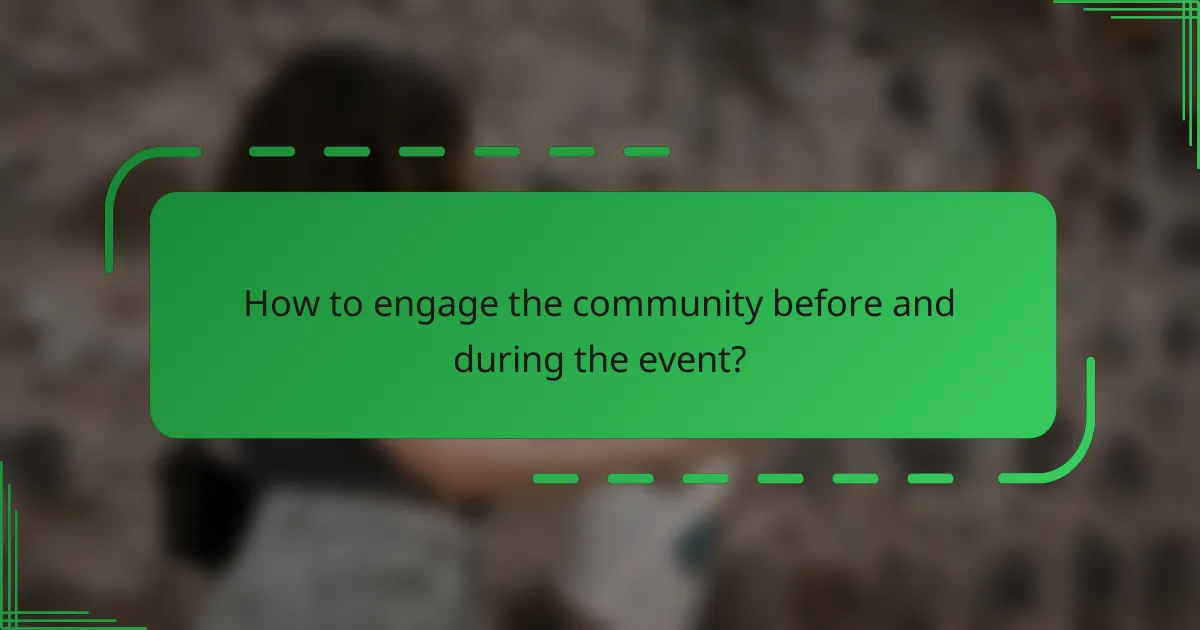
How to engage the community before and during the event?
Engaging the community before and during an event is crucial for building excitement and participation. Effective strategies include leveraging social media, hosting activities leading up to the event, and encouraging local volunteers to take part.
Utilize social media campaigns
Social media campaigns are an effective way to engage the community by sharing event details and updates. Create eye-catching posts and use relevant hashtags to increase visibility. Platforms like Facebook, Instagram, and Twitter can help you reach diverse audiences.
Consider running contests or polls to encourage interaction. For example, ask followers to vote on event themes or activities, which can enhance their investment in the event’s success.
Host pre-event activities
Pre-event activities can build anticipation and foster community connections. Organize workshops, meet-and-greets, or informational sessions that relate to the event’s theme. These activities can help participants feel more involved and informed.
For instance, if your event is a local festival, hosting a cooking class featuring local cuisine can attract interest and create a sense of ownership among community members.
Encourage volunteer participation
Inviting volunteers to participate can significantly enhance community engagement. Create clear roles and responsibilities for volunteers, ensuring they feel valued and integral to the event’s success. Promote volunteer opportunities through local organizations and social media.
Offering incentives, such as free event tickets or exclusive merchandise, can motivate individuals to sign up. Additionally, ensure volunteers receive proper training and support to enhance their experience and effectiveness during the event.
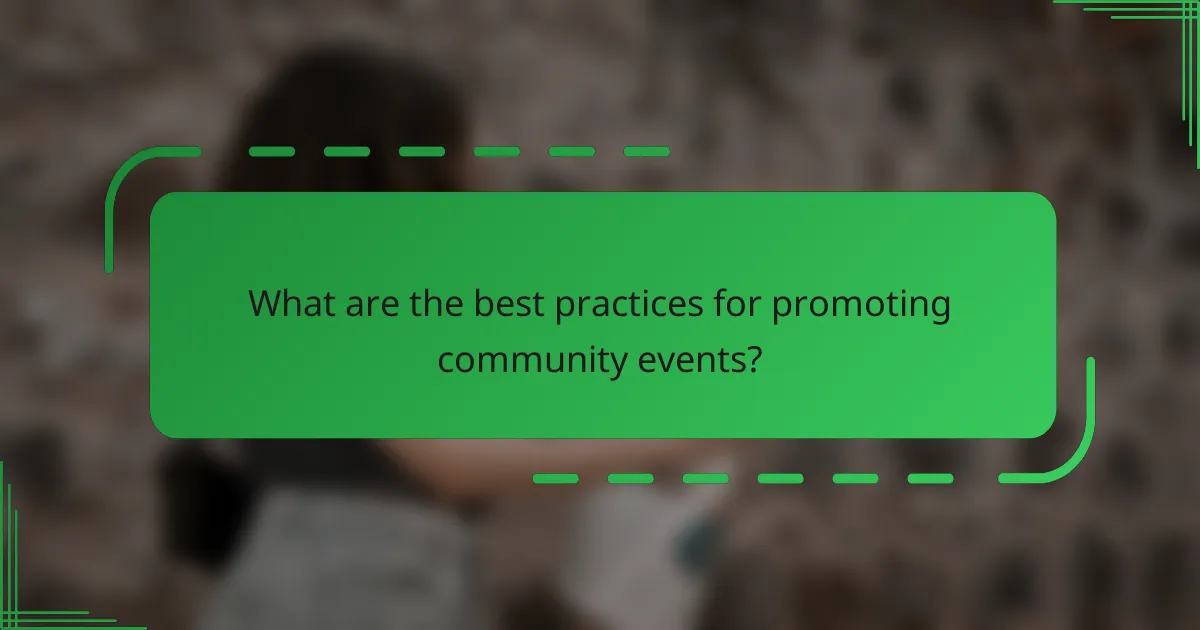
What are the best practices for promoting community events?
Effective promotion of community events involves strategic outreach, engaging visuals, and leveraging local connections. By utilizing various channels and resources, organizers can enhance visibility and attract a larger audience.
Leverage local media partnerships
Partnering with local media outlets can significantly boost event visibility. Consider reaching out to newspapers, radio stations, and community blogs to share event details and engage their audiences.
Offer exclusive interviews or behind-the-scenes access to journalists, which can create compelling stories that draw attention to your event. This collaboration can also lead to free publicity, enhancing your promotional efforts without incurring additional costs.
Create eye-catching promotional materials
Designing attractive promotional materials is essential for capturing attention. Use bold colors, clear fonts, and engaging images to create flyers, posters, and social media graphics that stand out.
Ensure that all materials include essential information such as the event date, time, location, and how to register or participate. Consider distributing these materials in high-traffic areas and online platforms to maximize reach.
Engage with local influencers
Collaborating with local influencers can amplify your event’s reach. Identify individuals in your community who have a strong following and align with your event’s mission or theme.
Invite them to participate in your event or provide them with promotional materials to share with their audience. This can create a buzz and encourage their followers to attend, increasing overall engagement and attendance.
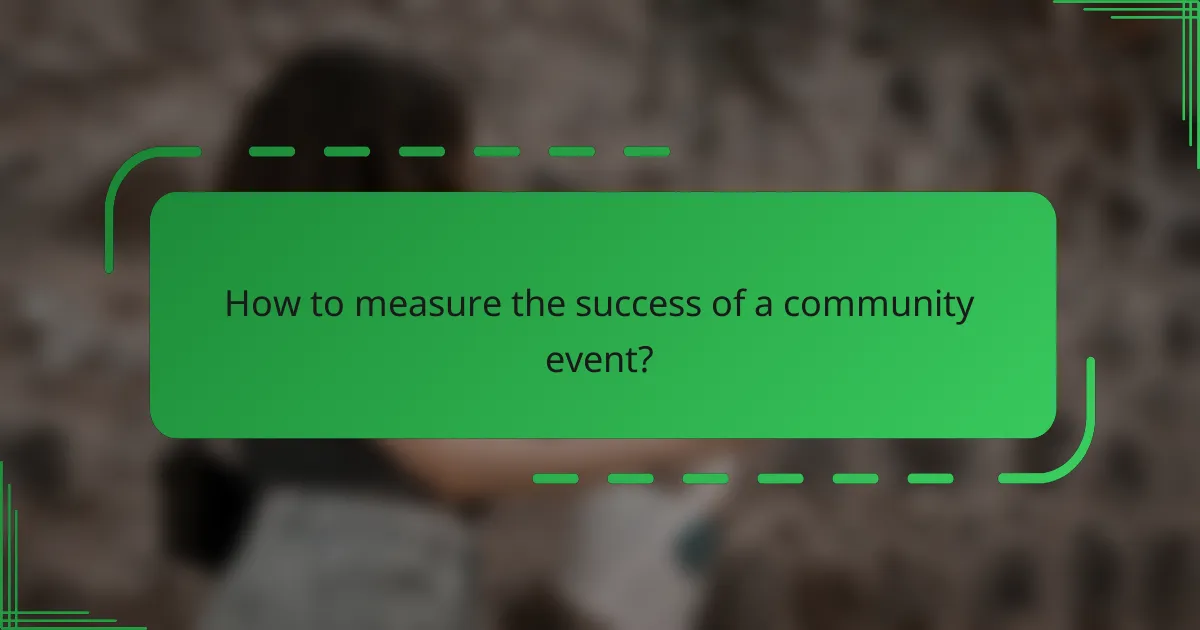
How to measure the success of a community event?
Measuring the success of a community event involves evaluating attendee satisfaction and participation levels. Key metrics include feedback from participants and quantitative data on attendance and engagement.
Collect attendee feedback
Gathering feedback from attendees is crucial for understanding their experiences and perceptions of the event. Use surveys or feedback forms immediately after the event to capture their thoughts while the experience is fresh.
Consider asking specific questions about what they enjoyed, areas for improvement, and whether they would attend future events. Aim for a response rate of at least 30% to ensure the feedback is representative.
Analyze participation metrics
Participation metrics provide insight into how well the event attracted and engaged the community. Track the number of attendees, the demographics of participants, and their level of interaction during the event.
For example, compare the number of registrations to actual attendance to calculate a participation rate. Additionally, monitor engagement through social media interactions or participation in activities, aiming for a balanced mix of both quantitative and qualitative data.
